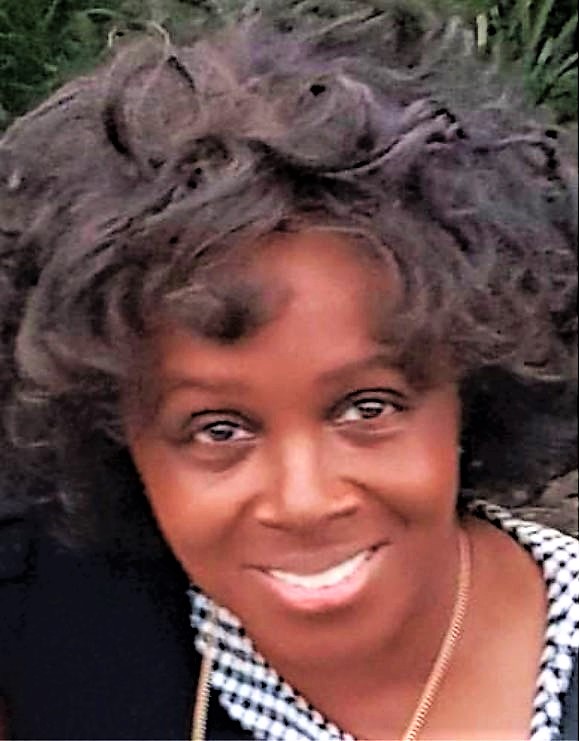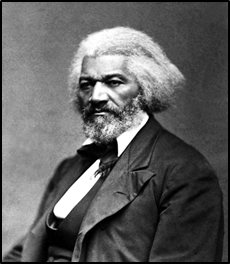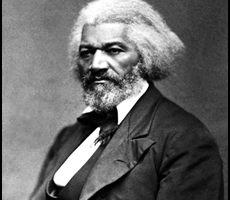By Maureen Grey

Frederick Douglass (1818-1895) was one of those historic figures who was always on the list of people to study for Negro History Week. Every American Black child knows or is supposed to know by second grade, especially if one attends a majority Black* student or faculty populated school. Douglass seemed to be current looking – his hair was natural and long – which was in vogue. Some of his suits looked like the one in Ebony magazine. His features were fiercely chiseled – which intimidated me as a child, but they expressed his passion to fight the establishment to gain equality – something that was a part of the 1960’s and 1970’s America my family had to learn about when we came to America. So much was studied about him during those school days, but no one mentioned that he was a Republican – just like our President, Richard M. Nixon. Today, five Black Republicans have taken new seats in Congress. This is just a sign of a rebounding Republican Party.
*Although African-American is more politically correct, I prefer to use Black as my racial nomenclature. That was the term of my upbringing and most of my adulthood; and serves as a common descriptor for my two African diasporic cultures.
When I first came to this country from Jamaica W.I, Douglass’ picture would often be placed next to Lincoln’s on the school bulletin boards highlighting Negro History Week – that is what the commemoration of Black historical figures was called. I still recall the bulletin board outside my first-grade classroom at St. Joseph’s Parish Day School in Queens Village, NY (Demolished, 2022). I recognized Martin Luther King, Jr., because he had just been killed, but the others I did not recognize. Those were all the American heroes. I was hoping to see the great Jamaican hero, Marcus Garvey, but he was not there. In second grade, we took days to cut silhouettes of Abraham Lincoln and George Washington from black construction paper so as to commemorate their February birthdays. We placed the silhouettes around the room and on the classroom bulletin board. Sometimes, we cut silhouettes for Frederick Douglass, but those were put on the Negro History Week bulletin board in the hallway. Over the years, we all learned that he was a runaway slave who became an eloquent orator for the emancipation of slaves despite not having a formal education. After writing several books such as the Narrative of the Life of Frederick Douglass, he was able to purchase his freedom from the proceeds. Ever promoting abolition of slavery, Douglass encouraged several northern abolitionist groups to pressure Congress to end slavery. Prior to and during the Civil War, Douglass persuaded Lincoln to allow the enlistment of Blacks to fight in the Civil War. We also learned that Douglass was President Lincoln’s friend. But that was mostly all that was emphasized. No one mentioned that he was a New York Republican.
A PROUD REPUBLICAN

Douglass was a proud Republican who encouraged fellow Black members to stay with the party despite the Supreme Court’s overturning the Civil Rights Act of 1875. This can be seen in the letter which was a response to a letter written by Private Dalzell. In the letter, following, Frederick Douglass indicates his beliefs and platform in independence and loyalty to the Republican Party:
“I am thought to be an Independent, and so I am, but I am an Independent inside of the Republican party. I can have all the independence I want inside of the Republican party. I am both independent and dependent…. My advice to colored men everywhere is to stick to the Republican party. Tell your wants, hold the party up to its profession, but do your utmost to keep it in power in State and Nation. (https://www.chicagotribune.com/entertainment/books/ct-prj-archive-frederick-douglass-republican-party-20150129-story.html)
Douglass’ life was remarkable. Douglass was a slave, a runaway, a Black man who eventually purchased his freedom, supported the Underground Railroad, a fiery and persuasive orator and author, newspaper editor and founder, a resident of Rochester, New York, thrown off a train for being Black in the North, an influencer who pushed Lincoln to issue the Emancipation Proclamation, and endorsed Blacks not just to settle just for freedom as seen in the 13th amendment but also strive politically for complete equality through future legislation. Douglass was so honored that he received a vote to be considered for the Republican presidential candidacy during the 1888 Republican National Convention (http://nkaa.uky.edu/nkaa/items/show/2950).
With all those victories, Douglass also witnessed reversal. The laws to provide equality and protection for Black freedmen/people were revoked by Southern representatives many of whom were Democrats and former Confederates who wanted Blacks to be politically non-existent. By the time Douglass died on February 20, 1895, he could no longer vote in his own city, Washington, D.C. Frederick Douglas was well renowned and respected, but he lost enfranchisement due to the laws which were based on the color of his skin, however he did not leave the Republican Party. He had faith that the Party that had led the country through the Civil War and Reconstruction was best suited to deliver the legal guarantees of Civil Rights to all Blacks and women because the Constitution was the foundation of the nation. Douglass believed in the Constitution. Perhaps that is why my generation of students in that small school just off Hempstead Avenue did not revere Douglass so highly. He was stripped of almost all that he fought for. We did not need another leader who lost his Dream – in death. After all, we just lost our Dreamer, Martin Luther King, Jr..
Why Black Republicans Left
Perhaps the reason Frederick Douglass’ contributions were not emphasized when I was in elementary and high school was that I was surrounded by Black Americans who may have left the Republican party. After Plessy v. Ferguson (1896), the Supreme Court case which legitimized “separate but equal” as a means of coexisting in America, life became harder for many Blacks in the North and the South. Those who could still vote looked towards the Republican party and candidates like President Theodore Roosevelt who looked for Black support, especially in his New York home state. Many Blacks remained with the Republican Party throughout the early twentieth century, but that changed once President Franklin Roosevelt addressed the needs of people suffering during the Great Depression. However, when President Harry Truman desegregated the military, the exodus of Black Republicans to the Democratic party was noticeable (https://www.pewresearch.org/fact-tank/2022/11/07/10-facts-about-black-republicans/). Truman’s actions may have prompted some Black Republicans to flee, but 1960’s marked the greatest exit from the Republican Party.
Many Blacks fled the Republican Party in droves in the mid 1960’s mainly due to Barry Goldwater and the signing of the Civil Rights Act. Barry Goldwater’s conservative platform encouraged states to enact civil rights individually, endorsed low taxes, opposed the Civil Rights Act, and promoted small government that “ ‘doesn’t give out handouts to black people…doesn’t have laws that interfere with states’ rights [or] …is not conducting a war on poverty.’” (https://www.npr.org/sections/codeswitch/2014/07/14/331298996/why-did-black-voters-flee-the-republican-party-in-the-1960s)
This was not what many Black Republicans wanted in a candidate. Many of the Black Republican voters were veterans of three wars, World War I, World War II and Korea, who supported themselves and families and were tired of living a life of disparity. Many young people who had been protesting or traveling South to register Black voters were not impressed with this return to the past-where people were denied rights.
Goldwater’s platform did not suit the times where people were observing the inequalities in America. What Goldwater could not understand was that party loyalty was secondary to surviving life. Many Blacks, then and now, tend to vote for candidates who seem to be able to promise equity and equality in the areas of life that matter most – jobs, housing, generational wealth, and education. Blacks in Queens were fighting for the right to live where they wanted (my parents were redlined in Westchester therefore we sought out Queens only to be redlined here too), equal pay, reduction in crime, access to personal, mortgage and business loans so as to build generational wealth, improved education in neighborhood schools, affordable university education, and greater job opportunities and promotions.
Goldwater was a person who reflected the concerns of many conservative Republicans at that time that the country was changing too quickly. The Black Civil Rights movement was challenging the status quo of not only southern de jure segregation life, but also northern de facto segregation which was particularly evident in Queens where redlining permitted Black families to live only in areas south of Jamaica Avenue (Jamaica, St. Albans, Addisleigh Park, and Hollis) or parts of Northern Queens (Flushing and Corona). So severe were the separation system in Queens, that at least 7 places were listed in the Negro Motorist Green Book. The Green Book, published by Victor H. Green from 1936 to 1964, provided Black drivers with lists of places they could eat or sleep that were safe from attack and death. (https://culinarybackstreets.com/projects-category/queens-project-category/2018/northward-bound-3/)
In addition to Goldwater’s platform, many Black Republicans left the party, after Lyndon B. Johnson signed the Civil Rights Act of 1964 days before the Republican Convention. The Democrats also had their issues with racial prejudice, but once the Civil Rights Act of 1964 was signed, many Blacks turned to the Democratic party. (Bates, Karen,Grisby, https://www.npr.org/sections/codeswitch/2014/07/14/331298996/why-did-black-voters-flee-the-republican-party-in-the-1960s)The Democratic president and leader of the Party had taken action to reduce the misery of many Black citizens in America who had suffered during slavery only to become virtual slaves again in a segregated country.
Goldwater lost the 1964 Presidential election in New York because he did not understand that although Blacks made up only 10.5% of America’s population in the 1960’s (https://www2.census.gov/library/publications/decennial/1960/pc-s1-supplementary-reports/pc-s1-10.pdf), the largest Black population outside of the South was in the North especially New York the home of the Harlem Renaissance. Goldwater did not anticipate defeat. New York City for decades had one of the largest urban Black populations in the country even from colonial days. “By 1756, enslaved Africans made up about 25% of the population of Kings, Queens, Richmond, New York and Westchester…” https://culinarybackstreets.com/projects-category/queens-project-category/2018/northward-bound-3/). After emancipation in New York in the 1830’s, many former slaves stayed in New York. Prior to the 1863 Civil War draft riots, the separate municipalities/counties of Queens, New York, Richmond, Bronx, Brooklyn had the largest Black population. About 25 percent of the Black population resettled elsewhere after the riots which had spread even to Queens (https://www.tenement.org/blog/ after-the-riots-new-yorks-black-community-responds-and-rebuilds/).
The New York Black population did not grow drastically after the Civil War until the Great Migration. The Great Migration, the era between 1916 and 1970 in which Southerners and Caribbean Blacks came to New York, led to an increased Black population that surpassed 1863 statistics. Many of those who came north were brought into the Democratic party by ward bosses who needed their votes, hence another reason many Blacks joined the Democratic Party. In the 1960’s, New York State commanded 43 electoral votes. New York State also had a Republican governor. New York City had one of the largest urban populations in the country.
Full Circle
Perhaps seeing the Civil Rights Act signed into law would have delighted Douglass – for he too suffered several times over because of his race. He went from slavery, to self-made freed man, to abolition advocate, to entrepreneur, to legal freedom, to enfranchisement, to national and international political servant, to ambassador, to ending his life in segregation-just another form of slavery unable to vote. It would seem that Douglass’ life was for naught, but in actuality he warned Blacks that they should always be vigilant when it comes to civil rights; for rights are only as important as the people who enjoy and protect them.
Over the past two years, many Blacks have become more vigilant with voting. According to Pew Surveys, more Blacks under the age of 30 are voting for Republican candidates. In the last midterm elections, the Party of Frederick Douglass gained five Black candidates who won seats in Congress – the most that they have had since 1870 when the first Black Congressmen were elected.
Although, according to Pew Research Center Study, “only about one in ten Black adults identify with or lean toward the Republican Party. (https://www.pewresearch.org/fact-tank/2022/11/07/10-facts-about-black-republicans/), however 25 percent of Black Democrats identify as conservative and 43 percent as moderate. (https://digitalnews.ua.edu/2021/04/black-republicans-growing-in-numbers/). These voter booth conservative leanings can alter the outcome for Republicans running for office. So although identifying as a Republican has not increased, the number of Republicans being elected to Congress has, due to voters who see more of their values reflected in modern Republican Party platform (https://digitalnews.ua.edu/2021/04/black-republicans-growing-in-numbers/). Perhaps this would delight Frederick Douglass who was relentless in supporting the Party of Abraham Lincoln. Despite the agonies, Douglass had faith in the Constitution and in the fulfillment of equal rights for all as long as people were unified.
Return to the Promise Land
Now that the biblical 40 years of wandering in the desert have passed, the Republican Party is enjoying a resurgence of Black votership and leadership. Five Black candidates were elected in the 2022 midterm elections. They were: Tim Scott (SC), Burgess Owens (Utah), Byron Donalds (FL), John James (MI) and Wesley Hunt (TX). This is the largest number of Black Republicans serving in Congress since the 1870’s.
https://digitalnews.ua.edu/2021/04/black-republicans-growing-in-numbers/
https://www.washingtontimes.com/news/2022/nov/9/black-republicans-elected-historic-numbers/
Although Douglass has been dead for nearly 130 years, many have kept his memory alive. One such person was Dr. Carter Woodson who created Negro History Week in 1926 in honor of Abraham Lincoln and Frederick Douglass who both were born in February. Today Douglass still inspires new Republicans. Given this progress in the number of Blacks elected to Congress, Frederick Douglass would have been happy to see so many practicing their right to vote. The Father of the Black Civil Rights Movement would be ecstatic to see Blacks returning to the Republican Party, however he would not want the returnees and new Republicans to ever leave without following his advice to “…stick to the Republican party. Tell your wants, hold the party up to its profession, but do your utmost to keep it in power in State and Nation.” But it is also up to the Republican Party to listen to its membership so as to preserve Black participation. Black members could vanish if concerns are not addressed quickly. It has happened before. We all should be grateful for Frederick Douglass who epitomized self-sufficiency, dedication, and fortitude in championing Civil Rights for all.
For more history of Queens, please attend the next meeting of the Southeast Queens Historical and Preservation Society on February 2, 2023. For further details email me at alumnicommunitynews@gmail.com.


